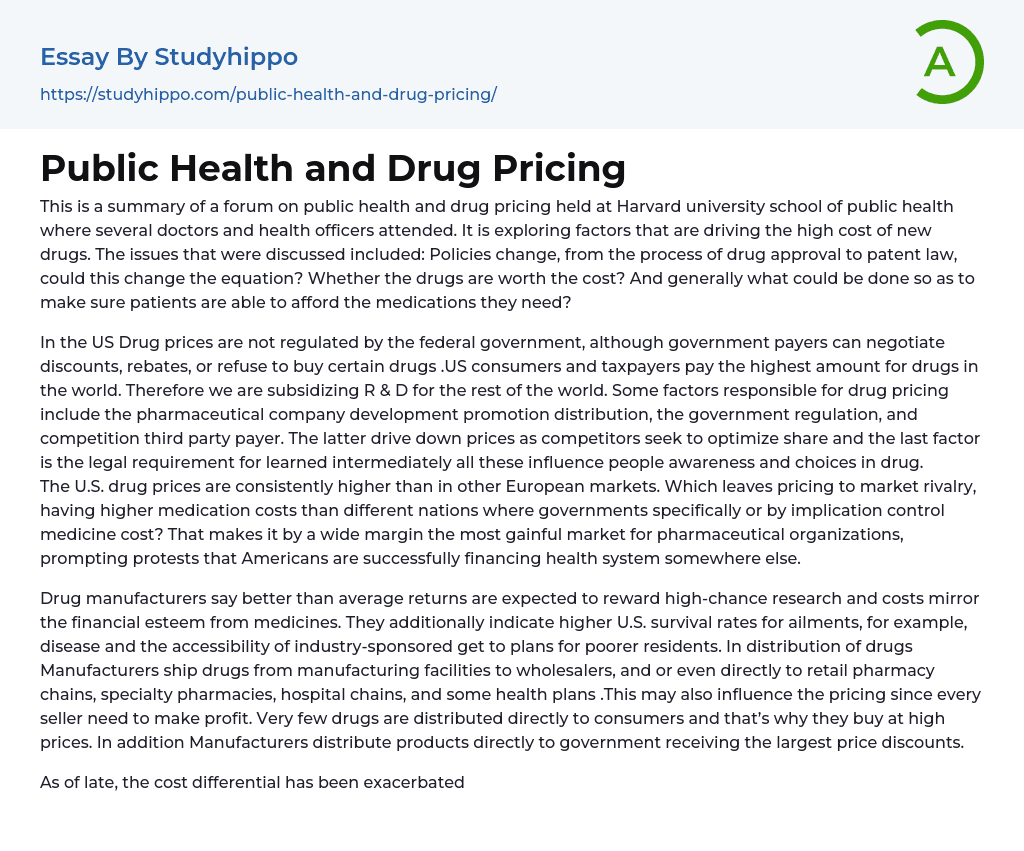The text discusses a forum held at Harvard University School of Public Health concerning public health and drug pricing. The forum involved numerous doctors and health officers, who focused on factors contributing to the high cost of new drugs. Key topics included potential changes in policies regarding drug approval and patent law, the correlation between drug value and cost, and strategies for ensuring patient affordability.
In contrast to other countries, the United States does not regulate drug prices through federal government intervention. However, government payers can negotiate discounts or rebates or choose not to purchase certain medications. As a result, American consumers and taxpayers end up paying more for drugs compared to any other country, effectively subsidizing research and development costs worldwide.
The pricing of drugs is influenced by several factors, including the development, promotion, and distribution efforts of pharmaceutical companies. Governm
...ent regulations and competition from third-party payers also play a role in determining drug prices. Competitors strive to increase their market share, leading to lower prices. Healthcare professionals have a legal obligation to understand these factors, as they influence people's awareness and choices regarding drugs.
Compared to European markets, drug prices are consistently higher in the United States. This disparity can be attributed to market rivalry, where medication costs surpass those in countries with government regulation of medicine prices either directly or indirectly. As a result, the US market becomes more profitable for pharmaceutical companies. Some individuals express concerns that Americans effectively subsidize healthcare systems in other countries.
Drug manufacturers argue that significant returns on investment are necessary to support high-risk research and that prices reflect the economic value of medications.
The text explores the factors behind higher surviva
rates in the United States for diseases such as cancer. It attributes these rates to access plans sponsored by industries, which cater to individuals with lower income levels. The text also highlights how drug manufacturers distribute their products through various intermediaries, including wholesalers, retail pharmacy chains, specialty pharmacies, hospital chains, and health plans. This involvement of multiple sellers in the distribution process can impact pricing since each seller aims to generate profits. Consequently, consumers end up buying drugs at inflated prices due to only a limited number of drugs being sold directly to them. Moreover, manufacturers directly supply products to the government and offer significant price reductions.
The rising costs of medications in the United States have been worsened by yearly price increases, while European nations have taken steps to restrict or lower prices. Turing, an unlisted company, caused controversy by raising the price of a well-established medication for a parasitic infection from $13.50 to $750 per pill. However, Turing has assured that they will reverse this price hike. The seminar addressed the issue of drug manufacturers lacking regulations on pricing and the lack of government oversight on medicine prices. These factors present challenges that include limited information for making financially sound choices.
The lack of a legal and regulatory environment is a contributing factor to the rising prices, as noted by medical officers. Additionally, the lack of transparency in the medical sector leads to inefficiency. To address these challenges, increasing the utilization of drugs may lead to more consumers and potentially lower prices set by pharmaceutical manufacturers. It is important for companies to provide justification for the prices they set on specific drugs.
Patients actors should be
given time to decide their preferred drug cost. The public health sector should prioritize innovations, as doctors encourage the biotechnology industry to be innovative. Policy makers should develop strategies for drug cost and value. Laws and policies can contribute to a positive relationship between specialists, patients, and backup plans. While pharmaceutical organizations and some financial experts argue that the high cost of medication advancement justifies the expense, caution is being raised over the soaring prices. Another topic discussed in the seminar was the role of society in medication pricing, suggesting the need for transparency. In Medicare negotiations, it is important to consider the cost and benefit of drugs for consumers. Educating patients and doctors on high-quality products is essential, emphasizing the importance of paying for drugs.
Presidential candidate Hillary Clinton is calling for the US central government to step in and advise drug manufacturers on pricing their products more affordably for the American population. Clinton is critical of current drug pricing practices and questioning why prices are significantly higher in the US compared to other countries.
- Cocaine essays
- Why Marijuana Should Be Legalized essays
- Drug Abuse essays
- Teenage Drug Abuse essays
- Social Care essays
- Epidemiology essays
- Drug Addiction essays
- Hiv essays
- Hygiene essays
- Obesity essays
- Teenage Pregnancy essays
- Birth Control essays
- Eating Disorders essays
- Causes Of Obesity essays
- Children Obesity essays
- alternative medicine essays
- Aspirin essays
- Cannabis essays
- Cardiology essays
- Cloning essays
- Dentist essays
- drugs essays
- Hemoglobin essays
- Medical essays
- Medical Ethics essays
- Organ Donation essays
- Patient essays
- Pharmacology essays
- Plastic Surgery essays
- Surgery essays
- Therapy essays
- Vaccines essays
- Addiction essays
- Anatomy and Physiology essays
- Biodegradation essays
- Cancer essays
- Dental Care essays
- Disability essays
- Disease essays
- Disorders essays
- Health Care essays
- Infectious Disease essays
- Inquiry essays
- Intelligence Quotient essays
- Lung Cancer essays
- Medicine essays
- Neurology essays
- Nutrition essays
- Olfaction essays
- Physical Exercise essays




